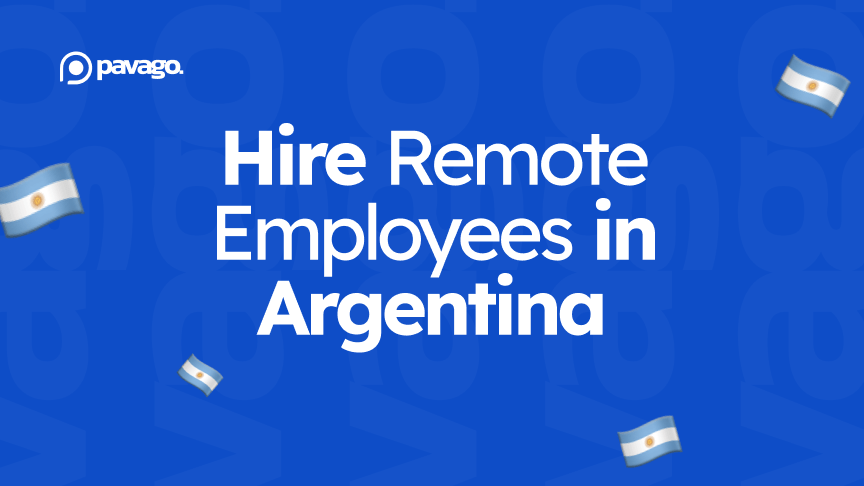Argentina is recognized for its highly skilled workforce and ranks as the most attractive country in Latin America for hiring remote talent. With a strong focus on education, Argentina has a pool of competent pros ready to bring their expertise to your business.
But before you jump in, there are a few things you need to know. Argentina’s labor laws, tax rules, and compliance issues can be tricky to navigate. This guide will walk you through the ins and outs of “hiring and paying remote employees in Argentina“, the key laws you should know, and how to stay compliant.
✌️ Need Help with Remote Hiring?
Let Pavago hire employees in Argentina—compliant, efficient, and hassle-free!
What is the Labor Law in Argentina for Remote Workers?
Argentina has solid remote work laws, specifically Telework Employment Law No. 27,555. The country also boasts a highly skilled workforce with a strong work ethic, adaptability, and professionalism. Argentina is considered the best in Latin America for English proficiency, making communication and collaboration with US businesses smooth and straightforward.
How to Hire Remote Employees in Argentina?

There are 3 ways of hiring and paying your remote employees in Argentina.
1. Setup a Foreign Entity
This option is best for businesses with a big budget and wanting to establish a long-term presence or hire a large team in Argentina. However, this process is time-consuming and costly, often taking months to complete.
| Pros | Cons |
|---|---|
| Direct market access | Time-consuming and expensive |
| No permanent establishment risk | Complex regulations |
| Ability to hire an unlimited no. of employees | Language and cultural barriers |
| A clear basis for hiring and processing payroll in Argentina | Strenuous banking procedures |
| Burdensome taxes | |
| Stringent labor laws | |
| Economic and political instability | |
| High inflation | |
| Dual-rate currency exchange | |
| Strong labor unions |
2. Hire Full-time Independent Contractors
It is best for small to medium businesses in the US who want to cut overhead costs thus looking for full-time remote employees in Argentina.
Contractors operate as independent entities, handling their own taxes and not receiving employee benefits. This setup gives employers flexibility and cost savings, making it an attractive option for managing remote teams in Argentina.
However, it can be challenging for SMBs to source and hire top-tier talent outside the USA. Don’t worry! You can avoid all the inconveniences of hiring and paying offshore employees by partnering with global offshore recruitment partners like Pavago. We help SMBs hire top-tier offshore talent from Latin America and Asia.
| Pros | Cons |
|---|---|
| A full-time employee | Less Control |
| Time alignment (EST) | Communication barriers |
| Excellent English | Cultural Differences |
| Highly Skilled | |
| Cost Effective | |
| Legally Compliant | |
| Free from taxes & Labour laws |
3. Partner with a Third Party – EOR
The third option is partnering with an EOR. EORs (Employer of Record) act as legal entities with a deep understanding of local labor laws and tax regulations.
A top-notch EOR takes care of all employment-related tasks and payroll duties for you. They handle everything from payroll management and benefits administration to remote hiring and onboarding. This allows you to build a compliant remote team in Argentina efficiently, keeping costs low and avoiding any compliance headaches.
Although Pavago isn’t classified as an EOR – we offer many of the same support services, including hiring, onboarding training, compliance assurance, and payroll management.
What sets us apart is our ability to Source Top Talent for you. We specialize in connecting US companies with highly skilled Latin virtual assistants.
Factors to Consider Before Hiring in Argentina

Legal compliance and labor laws should be your top priority when hiring remote employees from Argentina.
1. Legal Framework for Remote Work
Law 27.555: This law, enacted in 2020, specifically regulates remote work in Argentina. It applies to all employees who work remotely, either partially or entirely.
Written Agreement: Employers and employees must enter into a written agreement that specifies the terms of remote work.
Work Hours and Disconnect: The law emphasizes the right to disconnect. Employees are not required to respond to communications outside of their established working hours, and employers must respect this boundary.
2. Work Hours
Standard Workweek: The standard workweek in Argentina is 48 hours, typically spread over six days (8 hours per day). For remote employees, work hours should be clearly defined in the agreement.
Overtime: Any work beyond the agreed hours should be compensated as overtime. The law mandates a higher rate of pay for overtime (50% more during weekdays and 100% more on weekends or holidays).
3. Salary Ranges
Salary ranges in Argentina can vary widely depending on the industry, position, and experience level. As of 2023, the minimum wage in Argentina is around ARS 112,500 per month (approximately USD 300).
However, remote employees, especially in the IT and tech sectors, often earn significantly higher salaries. For example, IT professionals can earn between ARS 300,000 to ARS 800,000 per month (approximately USD 800 to USD 2,200), depending on their expertise and role.
4. Holidays
National Holidays: Argentina has 15 national public holidays. These include New Year’s Day, Independence Day, and Christmas, among others. Employees are entitled to these holidays without any deduction from their salary.
Annual Leave: Employees are entitled to annual leave based on their length of service:
- Up to 5 years of service: 14 calendar days.
- 5 to 10 years of service: 21 calendar days.
- 10 to 20 years of service: 28 calendar days.
- More than 20 years of service: 35 calendar days.
Maternal Leaves: Female employees are entitled to 90 days of maternity leave. This leave is typically divided into 45 days before the expected date of birth and 45 days after the birth. However, the employee can opt to take up to 30 days before the birth and use the remaining 60 days after the birth.
Special Leaves: Employees are also entitled to special leave for specific circumstances, such as marriage (10 days), maternal leave (2 days), or the death of a close family member (3 to 10 days depending on the relationship).
How to Pay Remote Employees in Argentina
Paying remote employees in Argentina involves several considerations. Here’s a detailed guide on how to pay remote employees in Argentina:
Choosing a Payment Method
Selecting a convenient and cost-effective payment method is essential. Options include:
International Bank Transfers: Pay employees in Argentina through direct transfers to employees’ bank accounts.
Payment Platforms: Services like PayPal, TransferWise, and Payoneer can facilitate smooth transactions.
Payroll Tools: Using a payroll tool like Plane can simplify the process and ensure compliance with local regulations.
💡 Pavago not only helps you hire top offshore talent in LatAm but also take the stress out of payroll management, so you can keep your focus where it belongs—on growing your business.
Currency Considerations
Decide whether to pay employees in US dollars or Argentine pesos. Each option has implications for exchange rates and transfer fees. It’s important to discuss this with your employees and consider the stability of the local currency.
Compliance with Local Tax Laws
Ensure that you comply with both US and Argentine tax laws. This may involve withholding taxes from salaries and reporting income accurately. Consulting with a tax professional can help navigate these complexities.
💡 Pro tip: Working with a reliable offshore recruiter like Pavago is the best way to navigate the complex employment and tax regulations in Argentina and ensure compliance.
Key Takeaways
Hiring and paying remote employees in Argentina opens doors to skilled talent in fields like software development, design, and customer support.
To pay remote employees in Argentina smoothly, ensure you’re compliant with local labor laws, understand the tax benefits available, and choose the right payment platforms to avoid headaches.
But beyond cost savings, don’t forget the value of embracing Argentina’s work culture—strong communication and relationship-building can make all the difference. By mastering these aspects, you’ll not only stay compliant but also create a motivated, productive team that drives your business forward.
Hire The Best Remote Talent with Pavago
Hiring independent contractors with Pavago helps SMBs get access to excellent offshore talent. Not only do we connect you with the best remote professionals, but we also handle payroll management, legal compliance, and smooth onboarding, all with zero replacement costs.
Focus on growing your business while we take care of the rest. Ready to hire remote employees from Latin America? Book a demo today and experience hiring made effortless.
















